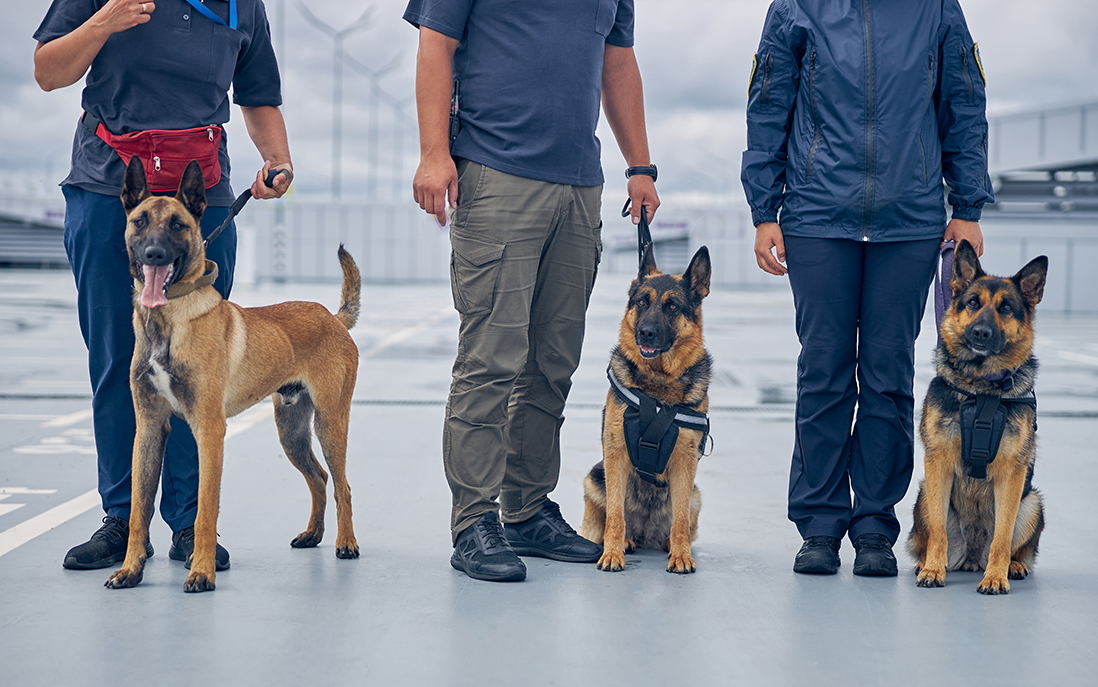A dogs’ sense of smell is 10,000 to 100,000 times more powerful than that of a human. They have 300 million scent receptors in their nose and the part of a dog’s brain that processes scent is 40 times larger than ours. That and their eagerness to work and to please make them indispensable for sniffing out explosives and other dangerous cargo. K9 teams have proven to be an effective and reliable addition to the mix of passenger and cargo screening methods in use by the TSA today.
There are currently two TSA K9 programs.
TSA-Trained K9 Teams
National Explosive Detection Canine Team Program (NEDCTP)
The National Explosive Detection Canine Team Program began in 1972 as a Federal Aviation Administration (FAA) program that was transferred to the TSA in 2002. Today, more than 1,000 TSA-trained canine teams from the NEDCTP are deployed nationwide for the protection of “all transportation environments including airport, terminal, freight, cargo, baggage, vehicle, bus, ferry, and rail.” The TSA provides the dogs and trains both dogs and handlers. These well-trained and hard-working K9 teams are either led by TSA staff (35%) or by other law enforcement personnel (65%).
Teams are trained and tested on “… four key elements:
- the canine’s ability to recognize explosive odors,
- the handler’s ability to interpret the canine’s change of behavior,
- the handler’s ability to conduct logical and systematic searches, and
- the team’s ability to locate the explosives’ odor source.”
Dogs are drawn from hunting and working breeds that need to stay busy and are eager-to-please, hard-working, smart, confident, and loyal. They include breeds like the Vizsla, German Shepherd, Labrador Retriever, Golden Retriever, Belgian Malinois, German Shorthaired Pointer and German Wirehaired Pointer.
Handlers undergo 12-weeks training for cargo screening or 16-weeks training for passenger screening. Once deployed, teams (dogs and handlers) are continually assessed for re-certification.
3PK9 – TSA-Certified Third-Party K9 Teams
Certified Cargo Screening Facility-K9 (CCSF-K9)
The TSA has a mandate that all cargo be screened by K9s, but the internal NEDCTP K9 teams have been principally focused on terminal security and could not provide enough K9 teams to fulfill the cargo screening directive. To fill the gap, a third-party K9 program was recommended in 2014 by the Aviation Security Advisory Committee (ASAC), an industry group providing aviation security advice to the TSA. Funding for a private sector canine program to supplement internal TSA capabilities was included in the 2017 Homeland Security Appropriations Bills.
The program that resulted is part of the TSA’s Certified Cargo Screening Program (CCSP) and is known as the Certified Cargo Screening Program K9 (CCSP-K9). It certifies private sector organizations to provide K9 teams for cargo screening.
This is a two-part program. First, each organizations must undergo an approval process to become a 3PK9 Certifier. This allows them to assess K9 teams. In the second phase, each K9 team (dog and handler) must pass a TSA certification process before they can begin screening cargo. On successful completion the K9 team is accredited as a Certified Cargo Screening Facility K9 (CCSF-K9).
In 2018, the program published the first list of approved 3PK9 Certifiers and announced the opportunity to become a registered Certified Cargo Screening Facility-Canine (CCSF-K9).
K9 Teams screening benefits
The air cargo industry moves massive amounts of cargo every day. In July 2020 alone, U.S. air cargo (cargo and mail) was recorded at 1,643 thousand tons, (1,235 thousand tons domestic & 408 thousand tons international). Cargo screening canines bring sensitivity, reliability and speed to keeping that cargo flowing, securely.
Effective screening of 100% of air cargo requires a strategy that;
✓ minimizes the potential for backlogs and delays
✓ has multiple screening points early in the supply chain
✓ maintains freight integrity throughout the supply chain
✓ meets TSA standards in a cost effective an efficient manner
K9 teams play an essential role in this strategy:
✓ K9 teams perform to a very high standard, testing to be many times faster than existing machine operations.
✓ K9 teams can screen cargo that is too big for machine screening.
✓ K9 Teams can screen palletized cargo without needing the cargo to be taken apart to screen and then reassembled.
Resources
https://www.pbs.org/wgbh/nova/article/dogs-sense-of-smell/
https://www.tsa.gov/sites/default/files/resources/caninetrainingcenter_factsheet_0.pdf
https://www.bts.gov/newsroom/annual-rise-us-airlines-july-cargo-13-largest-increase-decade
Aviation Security Advisory Committee (ASAC)
https://www.technologyreview.com/2019/10/24/132201/explosives-detectors-dogs-nose-sensors/
To speak with a CFS cargo screening specialist: Phone: (866) 255-6153, email: info@cfsdtw.com – or request a callback consultation.
About Commercial Freight Services
Commercial Freight Services (CFS) provides truckload, warehousing, and air cargo handling and security screening from their US hub in Michigan located near Detroit Metropolitan Airport (DTW). CFS is an active partner of the U.S. Transportation Security Administration (TSA), with a management team comprised of industry experts. Commercial Freight Services is a Certified Cargo Screening Facility (CCSF), Certified Cargo Screening Facility-K9 (CCSF-K9), and a certified Container Freight Station (CFS).

